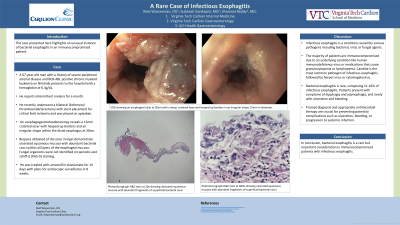Monday Poster Session
Category: Esophagus
P1874 - A Rare Case of Infectious Esophagitis
Monday, October 23, 2023
10:30 AM - 4:15 PM PT
Location: Exhibit Hall

Has Audio
- SG
Subhash Garikipati, MD
Carilion Clinic Virginia Tech
Roanoke, VA
Presenting Author(s)
Reid Wasserman, DO, Shravani Reddy, MD, Diana Dougherty, MD, Subhash Garikipati, MD, Patrick Rush, MD, Shehriyar Mehershahi, MD
Carilion Clinic Virginia Tech, Roanoke, VA
Introduction: The case presented here highlights an unusual instance of bacterial esophagitis in an immunocompromised patient.
Case Description/Methods: A 67-year-old man with a history of severe peripheral arterial disease and BCR-ABL positive chronic myeloid leukemia on Nilotinib presented to the hospital with a hemoglobin of 6.3 g/dL. Of note, he recently underwent a bilateral iliofemoral thrombendarteriectomy with stent placement for critical limb ischemia and was subsequently placed on apixaban. Since this procedure, he reports intermittent melena for a month. An esophagogastroduodenoscopy revealed an esophageal ulcer at 30cm with a deep, cratered base and heaped-up borders in an irregular shape 15mm in diameter. Biopsies were obtained of the ulcer margin to rule out malignancy. Histologic analysis revealed ulcerated squamous mucosa with abundant fragments of bacterial cocci within all layers of the esophageal mucosa. Fungal organisms were not identified on periodic acid schiff-d (PAS-D) staining. He was treated with amoxicillin-clavulanate for 14 days with plans for endoscopic surveillance in 8 weeks.
Discussion: Infectious esophagitis is a condition caused by various pathogens including bacterial, viral, or fungal agents. The majority of patients are immunocompromised due to an underlying condition like human immunodeficiency virus or medications that cause granulocytopenia or lymphopenia. Candida is the most common pathogen of infectious esophagitis, followed by herpes virus or cytomegalovirus. Bacterial esophagitis is rare, composing 11-16% of infectious esophagitis. Patients present with symptoms of dysphagia and odynophagia, and rarely with ulceration and bleeding. Prompt diagnosis and appropriate antimicrobial therapy are crucial for preventing potential complications such as ulceration, bleeding, or progression to systemic infection. In conclusion, bacterial esophagitis is a rare but important consideration in immunocompromised patients with infectious esophagitis.

Disclosures:
Reid Wasserman, DO, Shravani Reddy, MD, Diana Dougherty, MD, Subhash Garikipati, MD, Patrick Rush, MD, Shehriyar Mehershahi, MD. P1874 - A Rare Case of Infectious Esophagitis, ACG 2023 Annual Scientific Meeting Abstracts. Vancouver, BC, Canada: American College of Gastroenterology.
Carilion Clinic Virginia Tech, Roanoke, VA
Introduction: The case presented here highlights an unusual instance of bacterial esophagitis in an immunocompromised patient.
Case Description/Methods: A 67-year-old man with a history of severe peripheral arterial disease and BCR-ABL positive chronic myeloid leukemia on Nilotinib presented to the hospital with a hemoglobin of 6.3 g/dL. Of note, he recently underwent a bilateral iliofemoral thrombendarteriectomy with stent placement for critical limb ischemia and was subsequently placed on apixaban. Since this procedure, he reports intermittent melena for a month. An esophagogastroduodenoscopy revealed an esophageal ulcer at 30cm with a deep, cratered base and heaped-up borders in an irregular shape 15mm in diameter. Biopsies were obtained of the ulcer margin to rule out malignancy. Histologic analysis revealed ulcerated squamous mucosa with abundant fragments of bacterial cocci within all layers of the esophageal mucosa. Fungal organisms were not identified on periodic acid schiff-d (PAS-D) staining. He was treated with amoxicillin-clavulanate for 14 days with plans for endoscopic surveillance in 8 weeks.
Discussion: Infectious esophagitis is a condition caused by various pathogens including bacterial, viral, or fungal agents. The majority of patients are immunocompromised due to an underlying condition like human immunodeficiency virus or medications that cause granulocytopenia or lymphopenia. Candida is the most common pathogen of infectious esophagitis, followed by herpes virus or cytomegalovirus. Bacterial esophagitis is rare, composing 11-16% of infectious esophagitis. Patients present with symptoms of dysphagia and odynophagia, and rarely with ulceration and bleeding. Prompt diagnosis and appropriate antimicrobial therapy are crucial for preventing potential complications such as ulceration, bleeding, or progression to systemic infection. In conclusion, bacterial esophagitis is a rare but important consideration in immunocompromised patients with infectious esophagitis.

Figure: Mid-esophageal ulcer and esophagitis
Disclosures:
Reid Wasserman indicated no relevant financial relationships.
Shravani Reddy indicated no relevant financial relationships.
Diana Dougherty indicated no relevant financial relationships.
Subhash Garikipati indicated no relevant financial relationships.
Patrick Rush indicated no relevant financial relationships.
Shehriyar Mehershahi indicated no relevant financial relationships.
Reid Wasserman, DO, Shravani Reddy, MD, Diana Dougherty, MD, Subhash Garikipati, MD, Patrick Rush, MD, Shehriyar Mehershahi, MD. P1874 - A Rare Case of Infectious Esophagitis, ACG 2023 Annual Scientific Meeting Abstracts. Vancouver, BC, Canada: American College of Gastroenterology.
